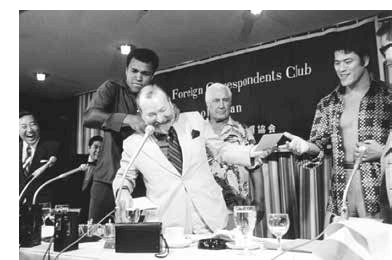Issue:

Boxer Muhammad Ali wowed the Club with his antics on June 18, 1976. He and pro wrestler Antonio Inoki appeared at a professional luncheon after a “weighing in” session for the “Bout of the Century” to be held a week later. Here, Ali playfully chokes FCCJ President Al Cullison (New York Journal of Commerce) who is attempting to hand an honorary membership card to Inoki while Ali’s manager looks on. Laughing to the left is Bill Shinn (Sisa News Agency). Partially visible next to Inoki is his interpreter and long time Club member, Ichiro “Ken” Urushibara.
The death of Ali on June 3, after many years of fighting Parkinson’s disease, brought back memories for people all over the world, including long time Members of the Club. The “Bout of the Century” ended up being the “rip off of the century” wrote then Member and sports writer Andy Adams (Sumo World) in a scathing review in the Japan Times. In his words: “Probably never in the history of sports has there been such a big buildup to such a big letdown as in this much publicized, $10 million contest between the world’s best boxer and one of the world’s top pro wrestlers.”
Ali and Inoki were born within a year of each other and both underwent name changes. Muhammad Ali was born Cassius Marcellus Clay Jr. on Jan. 17, 1942 and Antonio Inoki was born Kanji Inoki on Feb. 20, 1943. After their bout, they became good friends, and perhaps as a result of that friendship, Inoki converted to Islam in 1990. He took the same first name to become Muhammad Hussain Inoki, although this was not made public until 2012.
It would take a book to describe Muhammad Ali’s accomplishments. He was a major sports figure, including the winning of an Olympic gold medal and becoming the first three time heavyweight champion. He converted to Islam under the influence of the African American “Nation of Islam” and Malcolm X. A staunch fighter against racism and for civil rights, Ali also became a conscientious objector, refusing to be drafted for the war in Vietnam, which resulted in losing his boxing license for several years.
Antonio Inoki, too, went on to further accomplishments, becoming a lawmaker with an interest in international affairs. He negotiated with Saddam Hussein for the release of Japanese hostages in 1989 following his election to the Upper House of the Japanese Diet in the same year. Inoki was reelected to that body, the House of Councillors, in 2013 and remains active in Japanese politics.
A video of the FCCJ event can be viewed at this link: www.youtube.com/watch?v=Tn9OsmF-L8g.
— Charles Pomeroy

